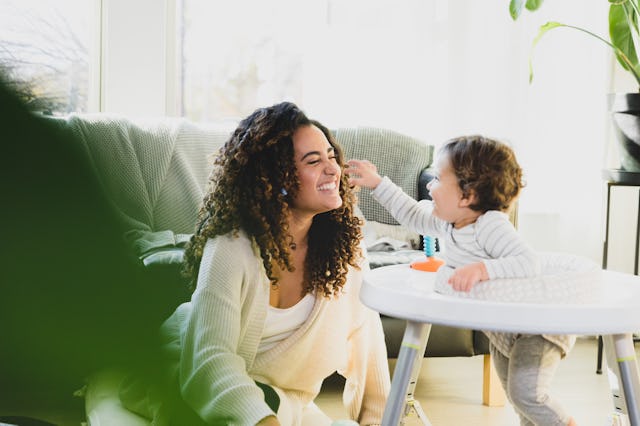Do I Have To Tell My Babysitter I Have Cameras? The Law & Ethics Of Home Video Surveillance
Find out if filming your child’s caregiver is even legal.

When it comes to raising kids, it really does take a village, which is why the support of babysitters, nannies, and other caregivers truly comes in handy — whether for day-to-day care or the occasional child-free night out with your pals and/or partner. But leaving your little ones alone with someone you don't know that well is understandably nerve-wracking, so you might be wondering whether or not it's a good idea to install surveillance cameras in your home to keep an eye on things while you're away. Of course, that extra layer of protection comes with plenty of inherent legal and ethical issues — namely, is it legal to record video footage of someone in your home? And even if it is legal, is it ethical? Should you inform your caregiver about your plans in advance, or even include them in a written contract?
Here to answer all your questions is Katie Provinziano, the founder and CEO of Westside Nannies, a nationwide domestic staffing agency based in Beverly Hills, CA.
Is it legal to film your babysitter when you're not at home?
"It is legal to install a nanny cam in your home in all 50 states," says Provinziano. "Generally speaking, you have the right to know what's going on in your home when you are not there." That said, Provinziano notes a number of states do have rules about cameras that record audio in addition to video. For example, in California, if you have a nanny cam that also records audio, you must disclose that either verbally or in writing to your caregiver. We advise our clients to do this in writing so that they have proof that they complied with the law."
Provinziano notes that the following states require disclosure of audio surveillance: California (as mentioned), Connecticut, Delaware, Florida, Hawaii, Illinois, Louisiana, Maryland, Massachusetts, Montana, Nevada, New Hampshire, Oregon, Pennsylvania, and Washington, adding that her agency advises parents in every state to let their caregiver know of surveillance cameras "in order to maintain trust within the employer/employee relationship." Additionally, she notes that "if the use of cameras that record audio was not disclosed to the caregiver, then the images or audio recordings may not be admissible in court as evidence of a crime or abuse."
Is it ethical, though?
What might seem like an obvious safety measure for you, your children, your home, and your belongings could understandably feel like a violation of privacy for caregivers, especially if you have a live-in caretaker.
"You absolutely cannot and should not place cameras in any place where one would have a reasonable expectation of privacy, like a bathroom or the nanny's bedroom," says Provinziano. "Recording in these areas could carry both criminal and civil consequences including sexual harassment, intentional or negligent infliction of emotional distress, as well as inappropriate conduct in the workplace — any of which could cost an employer dearly."
What steps should you take before you install cameras?
Should you decide that installing cameras in your home is the right choice for you, you'll need to have a formal conversation with your caregiver beforehand — ideally at the start of your working relationship as you establish expectations on both sides. "Nanny cams come with a couple of benefits, the most important of which is the opportunity for parents to check on their kids while miles away from home," says Provinziano. "It's undeniably an invaluable tool that affords parents assurance and peace of mind. However, if the use of these cameras is not communicated properly with the caregiver, they can lead to a fair share of consequences, too. Not only can it make your nanny feel awkward or troubled for not being informed from the get-go, but it could also erode trust and put the working relationship in jeopardy. No one likes to feel spied on while at work, and nannies are no exception."
If you would feel better installing cameras, Provinziano recommends putting it in writing — a lawyer can help you draft appropriate verbiage if needed. "At Westside Nannies, we always suggest that parents include all the information about their use of nanny cameras in the contract/work agreement to make sure everything's crystal clear for both parties before work commences."
What should you do if you suspect your babysitter/nanny of wrongdoing?
If you're in a situation where you believe your existing caregiver is engaging in unsafe or criminal behavior with or around your children, now is not the time to buy surveillance cameras for your home.
"Many parents purchase a nanny cam when they suspect their nanny is doing something they shouldn't be or feel like their children are not getting the best care," says Provinziano. "If that is you, do not buy a nanny cam, instead, go home and let your nanny go. Nanny cams should not be used to 'catch' your nanny — you have to trust the individual who is providing care for your children. If you feel that trust is not there or has been damaged, then I would encourage you to find a different caregiver. Nanny cams are not a substitute for your intuition. Always trust your gut."
This article was originally published on